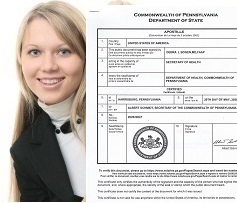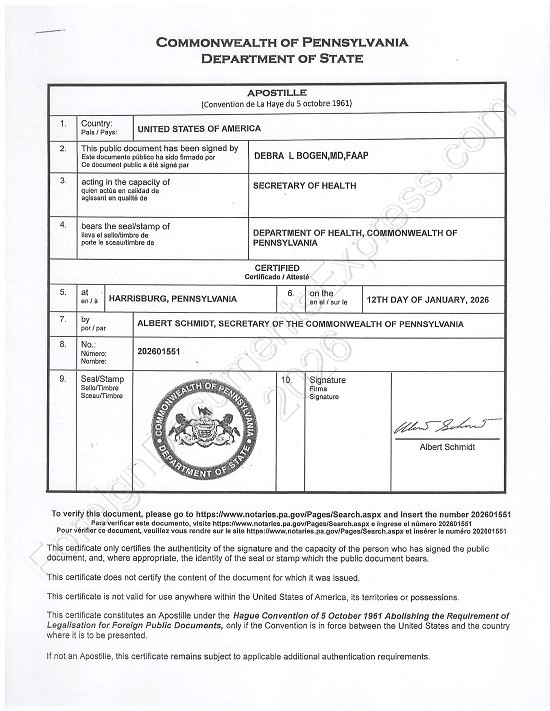Apostille Pennsylvania – Step-by-Step Guide to Requirements & Process
If your Pennsylvania document is intended for use outside the United States, it will need a Pennsylbania apostille or authentication. We provide Apostille and Embassy legalization services in the State of Pennsylvania and nationwide, for documents intended for international use.
Pennsylvania Hague apostilles are issued by the Pennsylvania Secretary of State. Hague apostilles have been adopted internationally as a uniform way of verifying documents sent between countries.

Pennsylvania has updated its Apostille format to a universal Apostille/single certificate.
The single certificate will be valid for both contracting and non-contracting parties to the Apostille Convention. The redesigned Apostille includes Spanish and French translations for each section. Additionally, the traditional raised gold seal has been replaced with an electronic seal printed in black ink.
![]() Pennsylvania apostille: $175
Pennsylvania apostille: $175
Processing time: app. 6-8 bus. days + mail
![]() Please complete the Order Form and mail it with your original document(s) to
Please complete the Order Form and mail it with your original document(s) to
If you are sending your document(s) from a foreign country, please use FedEx, DHL, UPS or TNT, and email the tracking number so that we can watch for your package.
 No hidden fees.
No hidden fees.
Our guarantee: If we are unable to get your documents apostilled or legalized, we will issue a 100% refund, we do not keep any service fees.
Free document evaluation
Want to double check before shipping your document? Email a copy for a free evaluation.
Pennsylvania apostille guidelines and tips
Your documents must be signed by and contain the seal of the Pennsylvania official who is the custodian of the record or a Pennsylvania notary public. The following documents qualify for Pennsylvania apostilles:
 notarized by a Pennsylvania notary (IMPORTANT! birth, death, marriage and divorce records cannot be notarized!)
notarized by a Pennsylvania notary (IMPORTANT! birth, death, marriage and divorce records cannot be notarized!) county documents signed by the clerk in charge of the county office (documents ARE NOT ACCEPTABLE if they are signed by an assistant or deputy clerk)
county documents signed by the clerk in charge of the county office (documents ARE NOT ACCEPTABLE if they are signed by an assistant or deputy clerk) certified copies of Birth Certificates, issued by Pennsylvania Department of Health
certified copies of Birth Certificates, issued by Pennsylvania Department of Health Death Certificates signed by the State Registrar (Death Certificates ARE NOT ACCEPTABLE if they are signed by a local registrar)
Death Certificates signed by the State Registrar (Death Certificates ARE NOT ACCEPTABLE if they are signed by a local registrar) certified copies of Marriage Certificates and Divorce Records issued by Pennsylvania County courthouses
certified copies of Marriage Certificates and Divorce Records issued by Pennsylvania County courthouses documents issued by Pennsylvania Department of State
documents issued by Pennsylvania Department of State Birth and death certificates must be certified copies issued by the Pennsylvania Center for Health Statistics. A certified copy of a county record is not eligible for apostille / legalization. Death certificates will not be accepted if they are signed by a local registrar. The signature of the Acting Secretary of Health is acceptable.
Birth and death certificates must be certified copies issued by the Pennsylvania Center for Health Statistics. A certified copy of a county record is not eligible for apostille / legalization. Death certificates will not be accepted if they are signed by a local registrar. The signature of the Acting Secretary of Health is acceptable.
 Marriage certificates must be issued and signed by the Clerk of the Orphans Court or the Register of Wills. Please note that a marriage certificates signed by officiant or clergy person are not sufficient. Marriage certificates signed by an Assistant or Deputy Clerk do not qualify for apostilles.
Marriage certificates must be issued and signed by the Clerk of the Orphans Court or the Register of Wills. Please note that a marriage certificates signed by officiant or clergy person are not sufficient. Marriage certificates signed by an Assistant or Deputy Clerk do not qualify for apostilles.
 Notarized documents (powers of attorney, affidavits, etc) should be properly notarized. The notary should use the acknowledgment or jurat basically of the following form:
Notarized documents (powers of attorney, affidavits, etc) should be properly notarized. The notary should use the acknowledgment or jurat basically of the following form:
Acknowledgment:
(for personal powers of attorney, affidavits, statements, letters, consents, copies of diplomas and transcripts signed by school officials, etc.)
Jurat:
(for personal powers of attorney, affidavits, statements, letters, consents, copies of diplomas and transcripts signed by school officials, etc.)
 Criminal record checks must be notarized. Here is a link showing how to get a notarized background check.
Criminal record checks must be notarized. Here is a link showing how to get a notarized background check.
 School transcripts and diplomas should be certified by a school official and notarized by a Pennsylvania notary (see the notarization requirements above). Read more about apostille requirements for school transcripts in Pennsylvania...
School transcripts and diplomas should be certified by a school official and notarized by a Pennsylvania notary (see the notarization requirements above). Read more about apostille requirements for school transcripts in Pennsylvania...
 Your document may be in a foreign language, no translation is required. However, the notarial statement (acknowledgment or jurat) must be in English.
Your document may be in a foreign language, no translation is required. However, the notarial statement (acknowledgment or jurat) must be in English.
We obtain apostilles for documents originating from all 67 Pennsylvania counties: Adams | Allegheny | Armstrong | Beaver | Bedford | Berks | Blair | Bradford | Bucks | Butler | Cambria | Cameron | Carbon | Centre | Chester | Clarion | Clearfield | Clinton | Columbia | Crawford | Cumberland | Dauphin | Delaware | Elk | Erie | Fayette | Forest | Franklin | Fulton | Greene | Huntingdon | Indiana | Jefferson | Juniata | Lackawanna | Lancaster | Lawrence | Lebanon | Lehigh | Luzerne | Lycoming | McKean | Mercer | Mifflin | Monroe | Montgomery | Montour | Northampton | Northumberland | Perry | Philadelphia | Pike | Potter | Schuylkill | Snyder | Somerset | Sullivan | Susquehanna | Tioga | Union | Venango | Warren | Washington | Wayne | Westmoreland | Wyoming | York
What does a "proper notarization" mean in the State of Pennsylvania?
![]() All notarized documents must contalin the notarial statement, either the acknowledgment or jurat.
All notarized documents must contalin the notarial statement, either the acknowledgment or jurat.
Acknowledgment:
(for personal powers of attorney, affidavits, statements, letters, consents, copies of diplomas and transcripts signed by school officials, etc.)
Jurat:
(for personal powers of attorney, affidavits, statements, letters, consents, copies of diplomas and transcripts signed by school officials, etc.)
Corporate Acknowledgment:
(for corporate powers of attorney, certificates of incumbency, affidavits, etc.)
Can Pennsylvania notaries attest to copies of the documents?
![]() Yes, except for vital records (birth, marriage, death certificates), documents issued by the courts (divorce judgments) or any other public records office.
Yes, except for vital records (birth, marriage, death certificates), documents issued by the courts (divorce judgments) or any other public records office.
Sample wording for certifying photocopies:
Copy Certification:
(for certifying copies of passports, IDs, driver licenses, transcripts, diplomas and other personal documents)
IMPORTANT! Copies of vital records (birth, death, marriage certificates, divorce judgments) cannot be certified by a notary public.
Can a remotely notarized document be apostilled in Pennsylvania?
![]() No. For notarized documents, the State of Pennsylvania requires the original signatures of the signer and the notary.
No. For notarized documents, the State of Pennsylvania requires the original signatures of the signer and the notary.
Does the State of Pennsylvania issue electronic apostilles?
![]() No. The State of Pennsylvania issues paper apostilles only.
No. The State of Pennsylvania issues paper apostilles only.
Are Pennsylvania apostilles issued for documents in foreign languages?
![]()
Yes. Your document may be in a foreign language. However (important!), the notarial statement must be in English.
Can a Pennsylvania apostille be verified?
![]() No. The State of Pennsylvania does not offer online verification of apostilles / certifications.
No. The State of Pennsylvania does not offer online verification of apostilles / certifications.
Questions concerning the validity of apostilles or certifications may be directed to the Pennsylvania Department of State, Bureau of Notaries, Commissions, and Legislation by calling (717) 787-5280 or by email:
Can a Pennsylvania apostille be rejected by a foreign country because it is a separate page (not a stamp), or because it is attached to the document by a staple?
![]() No. According to the Hague Convention Apostille brochure called "The ABCs of Apostilles from HCCH",
No. According to the Hague Convention Apostille brochure called "The ABCs of Apostilles from HCCH",
"An Apostille must be placed directly on the public document or on a separate attached page (called an allonge). Apostilles may be affixed by various means, including rubber stamps, self-adhesive stickers, impressed seals, etc.
If an Apostille is placed on an allonge, the latter can be attached to the underlying document by a variety of means, including glue, grommets, staples, ribbons, wax seals, etc.
Failure to affix an Apostille in a particular manner is not a basis for refusing the Apostille."
Foreign Documents Express customer reviews
See what our clients say about our apostille services in Foreign Documents Express Google reviews


